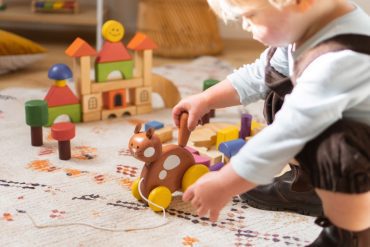By Elizabeth Pantley
During the early years of life, nap schedules are in a continuous state of change. After a newborn period of all-day napping, babies eventually settle into a regular two-naps-a-day routine. Most children switch from these two daily naps to one nap sometime between the ages of 12 and 24 months. However, that year of difference is a very long span of time. This shows that age alone is not the only factor to consider when changing your baby’s nap routine.
Changing your baby from two daily naps to one nap isn’t about what your child thinks he wants, nor is it about the schedule you’d like to have. It’s about the biological need for two naps versus one. Naps at different times of the day serve different purposes in mind and body development at different ages. For example, morning naps have more dreaming, or REM sleep, which makes them important for young babies who require it for early brain development. You don’t want to rush the process if your child is still benefiting from this important sleep time.
…morning naps have more dreaming, or REM sleep, which makes them important for young babies who require it for early brain development…
There is another consideration when deciding to make a schedule change: The length of time that your child is awake from one sleep period to the next has an effect on his mood and behavior. No matter how well your baby sleeps at night, naps are still very important. The older your child is, the longer he can go between sleep breaks without getting cranky. The biology behind this reason dictates that young babies need to divide their day up with two naps, but older babies can handle a full day with only one nap.
Since there is a wide range of what’s normal, it’s important to study each child’s behavior to see when he is ready to transition to one nap a day. Use the following lists as a guide.
Signs That your Child Needs TWO NAPS Daily:
- Your child is under 12 months old.
- When you put your child down for a nap he plays, resists, or fusses for a while but always ends up sleeping for an hour or more.
- When you take your child for car rides during the day he usually falls asleep.
- If your child misses a nap he is fussy or acts tired until the next nap or bedtime.
- Your child is dealing with a change in his life (such as a new sibling, sickness, or starting daycare) that disrupts his nap schedule.
- Your child misses naps when you’re on the go, but when you are at home he takes two good naps.











